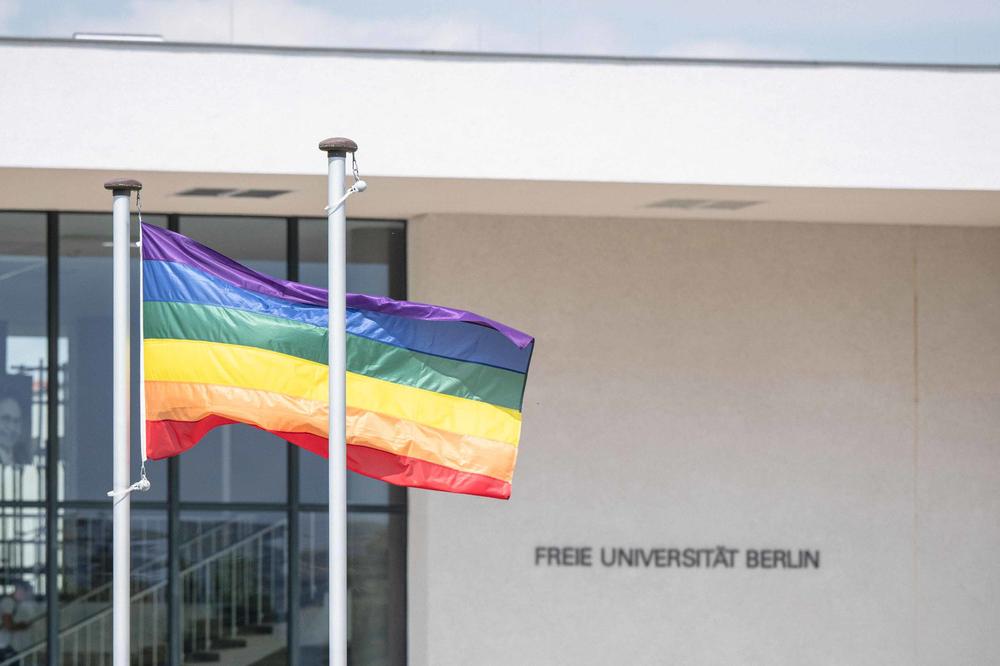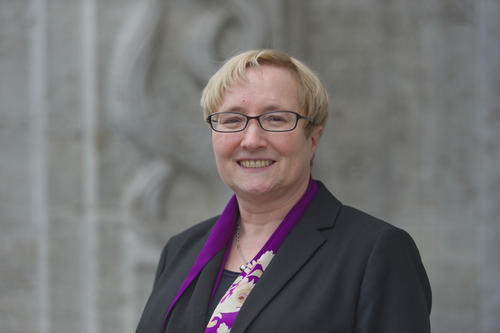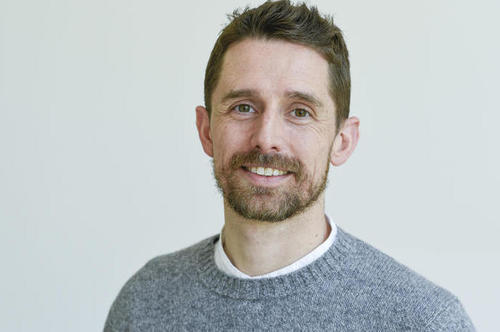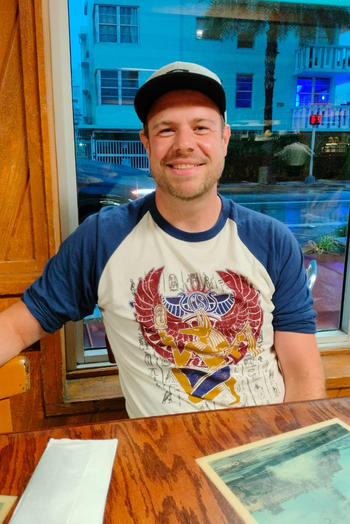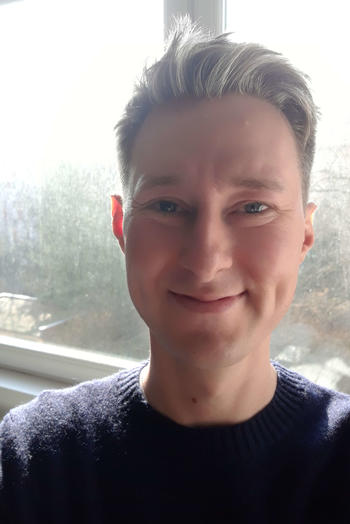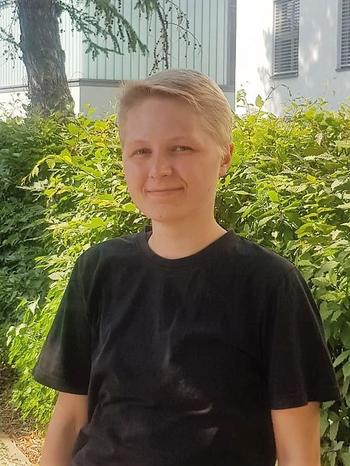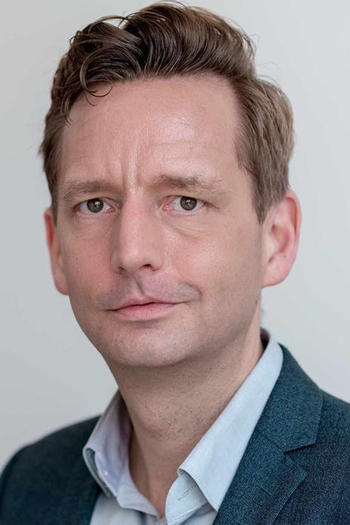Pride Month: Freie Universität Berlin Shows Its Colors
University kicks off Berlin’s Pride Month with a range of events, including the “Queer Contemporary Histories: International and Intersectional Perspectives” conference from July 1‒2, 2024 / An Interview with Freie Universität’s Queer Staff Network
Jun 28, 2024
The rainbow pride flag is a symbol of diversity, hope, and acceptance for members of the LGBTINQA++ community. This year will see the intersex-inclusive Progress Pride flag displayed centrally at Freie Universität Berlin for the first time.
Image Credit: Bernd Wannenmacher
Freie Universität Berlin will be participating in Berlin’s Pride Month with a series of activities, including a flag raising ceremony and a bilingual conference on queer contemporary histories. While the university has a long tradition of flying the pride flag on campus during Pride Month, the idea to integrate this year’s flag raising ceremony into the “Queer Contemporary Histories: International and Intersectional Perspectives” conference came from Martin Lücke, professor of history education at Freie Universität.
By flying the pride flag – an important symbol of diversity, hope, and acceptance for members of the LGBTINQA++ community – on campus during Berlin’s Pride Month, Freie Universität makes it clear that the university is open to all, regardless of gender identity or sexual orientation. The flag will be raised in front of the Henry Ford Building on July 2, 2024, as part of an official ceremony that will be attended by the president of Freie Universität Professor Günter M. Ziegler and executive vice president Professor Verena Blechinger-Talcott. This year, the flag raising ceremony will be integrated into the program of a conference on queer histories that will be taking place at Freie Universität from July 1 to 2, 2024. All interested parties are welcome to attend.Executive Vice President of Freie Universität Professor Verena Blechinger-Talcott, responsible for diversity and gender equity at the university
Image Credit: Bernd Wannenmacher
“Diversity and tolerance are values that Freie Universität Berlin stands for all year round, not just during Pride Month,” says Verena Blechinger-Talcott. “Our university welcomes people of all gender identities and sexual orientations, and we are committed to providing and maintaining an open, respectful, and safe environment for anyone who wishes to study, teach, or work here.”
An important point of contact for members of the LGBTINQA++ community who work at Freie Universität is the Queer Staff Network. In addition to the Diversity and Antidiscrimination Office – a centralized organ of the university aimed at acknowledging and promoting diversity and self-critically identifying, reflecting upon, and removing exclusionary practices and structures – the Queer Staff Network provides employees who identify as queer an informal, social space to meet up and share their experiences.
Japhet Johnstone, head of the Central Translation Office within the Office of Communication and Marketing at Freie Universität
Image Credit: Bernd Wannenmacher
One aim of the network is to create more visibility for an underrepresented group, according to Japhet Johnstone, who leads the university’s Central Translation Office and has helped coordinate the Queer Staff Network since it was founded in November 2022. “I am in the privileged position of being ‘out’ at work, but I am aware that many are not. In organizing the Queer Staff Network, I want to pass this privilege on to others and to hopefully help other colleagues at Freie Universität to feel more welcome at our university.”
Matthew Emery, English instructor at Freie Universität's Language Center
Image Credit: Personal collection
Matt Emery, an English instructor at Freie Universität’s Language Center and fellow member of the Queer Staff Network, agrees. “I have worked at four universities, and Freie Universität is the first one to offer not only a point of contact for queer students, but also one for queer staff,” he says. “This is very special indeed.”
His colleague Darren Paul Foster, also an English instructor at Freie Universität’s Language Center, feels that the Queer Staff Network is an important resource for employees. “In the day-to-day of the job, there isn't really that much space to talk about queer topics, which is why I really appreciate having the queer network there,” he says. However, he also emphasizes that his students at the Language Center are generally very open-minded about the subject. “They tend to open up to us more when we provide the opportunity to exchange pronouns at the beginning of the course.”
Darren Paul Foster, English instructor at Freie Universität's Language Center
Image Credit: Personal collection
Foster sees experiences such as this as evidence of more and more university members feeling safe enough to openly discuss their gender identity with students, instructors, and colleagues. However, it does raise the question of whether the same can be said for other areas of the university. “At the Language Center, I tend to teach students who major in the humanities or social sciences, and they tend to have already had courses that focus on gender in some way, which means they are definitely more sensitized to the issues than students from other disciplines where this is less focussed on,” says Foster.
Kristina Lewandowski, research associate in criminal law at Freie Universität's Department of Law
Image Credit: Nigar Asadullayeva
Kristina Lewandowski works as a researcher at the Department of Law and has been co-coordinating the Queer Staff Network with Johnstone for the last year. She says, “As a queer person, it helps to exchange experiences with people facing similar issues in their day-to-day lives.” While she reports having experienced more acceptance in some departments than in others, Lewandowski says that this is usually the result of specific individuals and not entire institutes. Some members of the network are employees who talk openly about their private lives at the regular Queer Staff Network meet-ups, but who have yet to come out in a professional context. This is largely due to the fear of negative reactions from their colleagues. “But generally I feel welcome here on campus,” says Lewandowski.
Martin Lücke, professor of history education at the Friedrich Meinecke Institute, Freie Universität Berlin
Image Credit: Freie Universität Berlin
Acceptance, Support, Visibility
Martin Lücke, queer history specialist and professor for history education at the Friedrich Meinecke Institute agrees. He is one of the organizers of “Queer Contemporary Histories: International and Intersectional Perspectives,” a conference that will be taking place on Freie Universität Berlin’s campus in Dahlem from July 1 to 2, 2024. Lücke says, “Queer topics are met with support from the Executive Board, and we almost always receive positive feedback for project ideas like our conference this summer.” Ten years ago, he would have had to explain the importance of queer studies to his students, says Lücke, but nowadays this is more self-evident. His students are motivated to examine the relevance of plural gender identities, for example, when considering potential topics for their theses
“Queer Contemporary Histories: International and Intersectional Perspectives” Conference
“In the long term, I hope that queer research can occupy a more stable position in the research landscape and receive the institutional support it needs. This would enable academics to research and teach queer topics without having to rely on third-party funding,” says Lücke. This is key to raising public awareness of queerness, something which Lücke admits is still a societal challenge.
The conference “Queer Contemporary Histories: International and Intersectional Perspectives” aims to contribute toward boosting this kind of awareness. In five panel discussions, held across two days, the conference will offer a space that inspires discussion, raises awareness of current research topics in the field of queer history and promotes a greater understanding of gender diversity today.
The first day of the conference will address topics such as queer art, the criminalization and pathologization of sexual identities, as well as alliances and conflicts within and outside the LGBTINQA++ community. The keynote speech, “From San Francisco to Berlin: Transnational Black Queer Connections,” will be held by historian Tiffany N. Florvil (University of New Mexico, USA).
The second day of the conference is dedicated to topics such as memory, public history, and class. Participants are also invited to attend the university’s flag raising ceremony at 3:45 p.m. This symbolic event will be followed by a roundtable about “How Bright or Bleak Are the Histories and Future Prospects of Queer Topics in Research and Education?” with prominent North American cultural anthropologist and LGBTQ scholar Esther Newton (University of Michigan, USA), political sociology researcher Mike Laufenberg (Friedrich Schiller University Jena), and Tiffany N. Florvil.
Japhet Johnstone, Kristina Lewandowski, Darren Paul Foster, and Matt Emery from the Queer Staff Network see the conference and the flag raising ceremony in a positive light. Attendance at the Queer Staff Network’s monthly meeting usually ranges between five and twenty people, say Johnstone and Lewandowski. Having the pride flag flown at Freie Universität Berlin during Berlin’s Pride Month sends an important message.
Foster says, “It makes me feel like we are being taken seriously.”
Lewandowski says, “Seeing the pride flag at your place of work means so much more than seeing it, for example, at your local supermarket. To come here every day and have the feeling that I am accepted and welcome here is something that really makes a difference.”
Johnstone adds, “The pride flag shows that the university embraces diversity, which is a great feeling.”
The original German version appeared in campus.leben, the online magazine published by Freie Universität Berlin.
Further Information
Conference
The conference “Queer Contemporary Histories: International and Intersectional Perspectives” will take place on July 1, 2024 (9:00 a.m.‒8:00 p.m.) and July 2, 2024 (10:00 a.m.‒6:30 p.m.) in the Henry Ford Building (Garystraße 35, 14195 Berlin). It will be held in both German and English.
Admission is free of charge but attendees are asked to register in advance: j.reimann@fu-berlin.de
Film Screening
Interested members of the public are invited to attend the pre-program event on June 30, 2024, for a special showing of the film “Ester Newton Made Me Gay” at 4:00 p.m. in Berlin’s Kino Central (Rosenthaler Straße 39, 10178 Berlin).
The showing will be followed by a video call with cultural anthropologist and early proponent of queer studies Esther Newton.
Flag Raising Ceremony
The flag raising ceremony will take place on July 2, 2024, at 3:45 p.m. by the Henry Ford Building (Garystraße 35, 14195 Berlin), with Freie Universität president Professor Günter M. Ziegler and executive vice president Professor Verena Blechinger-Talcott in attendance.
The ceremony will be followed by a small reception.

